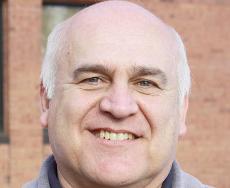According to his students,
Professor David Bates, from
the Department of Language
and English, is an educator
with something very important
to teach no matter what
your major: to think for
yourself and see things as
they really are. The view of
Ashley Wunder, a History
Major from Levittown is
typical: “His class really
opens your eyes and puts
everyday life into a different
perspective.” She added,
“I’ve been lucky to have
taken courses taught by
many really brilliant and
inspiring teachers, but I’ve
taken two courses with Prof
Bates and he has always
been my favorite.”
The theme that one learns
a lot about life is found in
many of the favorable
reviews by former students
found on
RateMyProfessor.com. For
instance, a comment, posted
on Feb. 2, 2009, reads:
“Bates was the most influential
professor I have ever
had. I had him for literature
and he opened up my mind
on so many levels. To this
day I take the lessons he
taught us in class and use
them on a daily basis.”
Bates currently teaches
writing and composition
courses at Bucks. One reason
that students get so
much out of his writing and
composition classes is that
Bates has an exceptionally
broad scope of knowledge to
draw from, with BAs in
History and Literature (
Virginia Commonwealth
University and George
Mason University, respectively),
MAs in History,
Education, and Literature (
The University of Florida (a
dual major in History and
Education), and Miami
University), and an expected
doctorate in American
Studies from The University
of Texas, where he will be
defending his dissertation
and expects to receive his
PhD. this Spring.
In a career that spans 30-
some years, Bates has taught
in a variety of disciplines:
“math, literature, composition,
history, social psychology,
mythology, and probably
several other topics…”
He has taught in the ghettoes
of Cincinnati, in
Eastern Connecticut (where “45 percent of the community
lived on welfare”), and in
universities such as The
University of Texas, The
University of Florida, Miami
University, and Temple
University. He also teaches
“short seminars for my peers
on Lewis Mumford (his philosophy),
Hermann Melville
(“Bartleby the Scrivener”),
and William Carlos
Williams (How to teach
Williams from a feminist
perspective),” said Bates.
Bates chose American
Studies because he wanted
to understand “why things
had unfolded the way that
they had.” American
Studies is an interdisciplinary
study that “encompasses
History, Literature,
Sociology, Psychology, and
Linguistics, among others.”
Rather than pursue a narrower
discipline that would
have made it easier to get
employment, Bates says he arrived as I was sliding out
of my car. The bus decanted
the young men in their
wheelchairs, the amputees
without any legs, and at 30
below they raced each other
across the parking lot, leaning
into the wind. I’ve often
thought that if legless men
could race in the dark in the
joy of the endeavor, waiting
for the chance to listen to
me, then I at least could pick
up the challenge and work
to say something important.”
Whatever the reasons, it is
evident that Bates puts a lot
of effort and feeling into his
classes. “I would rate professor
Bates at the top of my
list of teachers because most
of my other teachers didn’t
care as much and were not
as passionate and enthusiastic
about what they do,”
was the way Scott Noyes, a
Liberal Arts and American
Studies major from
Morrisville put it.was after broader knowledge.
He neatly encapsulated
his point of view on education,
his students’ as well
as his own, by offering this
quote from Lewis Mumford,
noted American historian,
philosopher and literary critic:
“‘To know more and
more about less and less is,
ultimately to know less and
less.'”
Racing on Wheelchairs to
Get to His Class
There are a lot of reasons
that motivate Bates to put so
much thought, caring and
effort into teaching, but the
following anecdote he related
ranks high among them.
Bates was teaching in
Connecticut. He used to
arrive early in the dark
morning to prepare for class:
“The asphalt was obsidian
slick with the veneer of ice,
and the bus which brought
the wards of the State to the
College each morning Focusing on Proof, Logic
and Reason
Bates eschews straight
lectures, preferring the back
and forth questioning and
answering of the Socratic
Method, “which places an
emphasis on flexibility,” and
allows him to “focus in on a
student’s or class’ interest.”
He wants his students to
be able to “step away from
the abstractions of life and
address the reality in terms
of what they really see, feel,
taste, experience and
believe, instead of what they
have been told to believe.”
One Comp. student wrote on
RateMyProfessor.com on
May 28, 2008 that, “David
Bates teaches his students to
stare the universe in the eye
with unwavering clarity.”
“I focus on proof, logic,
and reason” Bates says. “I
want them to see that they
need [to] think for their own
reasons and not another’s. I guess that’s what I would
say that I teach.”
A 2008 Literature student
advised online: “Whether
its academic writing, critical
thinking or life lessons –
YOU’LL BENEFIT!”
Although most on-line
posters gave him high
marks, a few didn’t. Those
few that wouldn’t recommend
him typically complained
about having to
work hard. None of the students
interviewed for this
article felt that Bates worked
his students overly hard.
Bates Emphasizes Issues
That Are Current in
Students’ Lives
Bates selects “texts that
reflect issues current in my
students’ lives today.”
Addressing his use of texts,
another Literature student
posted this on Aug. 15,
2008, “Professor Bates
offers an eye opening look
into the world through the
selected text. Well known
authors’ works are examined
in such a way that it strips to
the raw truth about people
and how they function within
their environment.”
As a for instance, he
pointed out that one of his
classes is currently reading
Joseph Heller’s Catch 22, a
book about war. “We’ve
been at war for a decade.
So I try to get my students
to look at the issue of what
war really means. Not the
fictions that they see on TV,
but the human reality, and
the human cost of war.”
The realities of war are
sometimes brought home by
the students themselves.
One of Bates’ students last
year had just returned from
Iraq: “[H]e stood in tears
and spoke of what he had
seen and how he carried
those experiences with him
day to day and from night
through sleepless night. I
had a mother almost my age
several years ago who
spoke, in tears, of her son
who had died in the war.”
Using Mock Trials to
Create a Supportive
Community of Students
His methods of teaching
Catch-22, as well as other
some other texts are unique.
He has his literature class
self-divide into judges, prosecutors,
and defense attorneys.
After several weeks of
preparation, two-and-a-half
hours of class time are
devoted to mock trials of
several key characters. Bates studied teaching by
way of simulation during
graduate school in
Education: “The idea in the
trials is to get people
involved in their own education,
to get them to see the
texts and ideas as part of
their lives and not just some
abstract memorization project.”
Jacob Madrack, a
Journalism Major from
Bensalem, said that the
mock trial “was one of the
best aspects of the class as a
whole in my opinion.”
Another purpose of the trials
is to create a community
of students. “The research
in Education says that … if
[students] see themselves as
studying within a community
of students, their chances
of educational success skyrocket.
If, on the other
hand, they see themselves as
standing alone, isolated and
alienated, they become ripe
candidates for either failure
or self-selecting out of education.”
“Preparing for the trials
absolutely brought my classmates
closer to one another,”
observed Madrack. On the
other hand, Gary Rubin, also
from Bensalem and who is
thinking of picking teaching
as his major, found that the
trials only “somewhat” promoted
the bonding. He said,
“I believe that since the
course had a lot of dialogue
a certain bonding emanated
from the classroom discussions.”
An Opportunity that
Shouldn’t be Missed
In the viewpoints of the
students that I have interviewed
and the scores of online
evaluations by former
students that I have read,
one theme is particularly
evident; David Bates says
and teaches a lot of important
things. This writer has
taken Bates’ American
Literature from 1865 course
and continues to discuss
Literature and various
aspects of the human condition
with him on a regular
basis. In this writer’s opinion,
supported by the opinions
of a large number of
former students, no matter
what your interests or major
are, if you are really interested
in learning, taking a
course with David Bates
will greatly enrich your education
and your life.
Professor Profile: David Bates
JOHN MACDONALD
•
February 23, 2010


